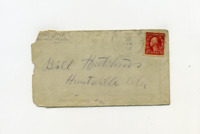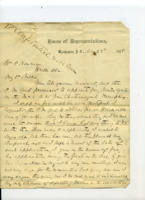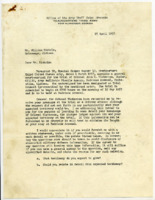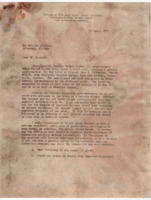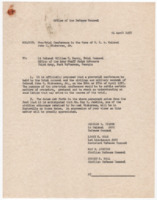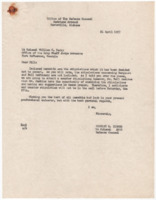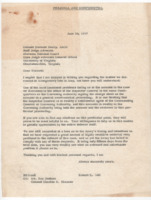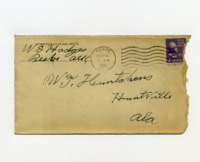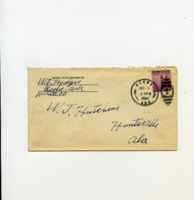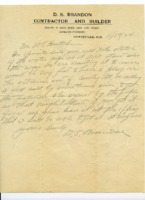
Browse Items (8239 total)
Sort by:
-
Letter to William Thomas Hutchens from Mr. Charlie Willmore.
Willmore writes that he had lived with grandmother Casey who left a will and mortgaged property to him. He states that he will "make it right with you" if Hutchens investigates and helps him get his estate left to him. -
Letter to William P. Newman from William W. Garth.
This letter marked "confidential read and burn," this letter is in response to a telegram sent earlier by William P. Newman. Garth states that he promised to appoint "Jno". He further writes that when "Jno" is notified of this, Newman is to say nothing as Garth does not with anyone to know he had anything to do with it. He writes that the only chance he has of defeating Moore in the convention is a "solid vote of Madison, Jackson, and Morgan." He concludes by stating that he wanted "simply to ask you" to help him obtain this "solid vote in Madison" and to put in a good word for him in Jackson as well. He reitterates that the letter is confidential and should be burned. -
Letter to William Nichols from William G. Barry.
Letter requests William Nichols' presence at the trial of Colonel John C. Nickerson, Jr. It also includes questions Nichols is to answer in a written statement and an anticipated range of dates he will be expected to give his testimony in court. -
Letter to William Nichols from William G. Barry.
This letter requests William Nichols to be present at the trial as a defense witness and a written statement from Nichols to detail what his testimony would be. The letter includes questions for Nichols to answer in the written statement. -
Letter to William G. Barry from the Defense Counsel.
This letter requests a pre-trial conference be held on the 26th or 27th of April, 1957. -
Letter to William G. Barry from Charles R. Zimmer.
Zimmer writes to Lt. Colonel Willaim G. Barry with the stipulations that will not be accepted in the case of Colonel John C. Nickerson. -
Letter to Walter Emmett Perry from Robert K. Bell.
The defense counsel believes that the Commanding General or Convening Authority is both the accuser and the reviewer in the proceeding. Bell asks Perry in this letter for any "citations" on that particular point. -
Letter to W. T. Hutchens from W. E. Hodges.
This letter from W. E. Hodges discusses his current health stating that the doctor said it would be a "long time" before he is able to work all day again. He asks for any old clothes that Hutchens and his family no longer need and he will be glad to get them. -
Letter to W. T. Hutchens from W. E. Hodges.
This letter from W. E. Hodges details current happenings in cousin Hodges life. He requests coats and pants and writes that he "will glad get them." Hodges ends by stating he will be 70 years old the next year. -
Letter to W. T. Hutchens from D. S. Brandon.
Brandon, contractor and builder, writes to Hutchens about a petition to be signed by the people in the neighborhood that will allow a water pipe to stretch to the end of Conley Street. The letter includes an illustration of the proposal.
